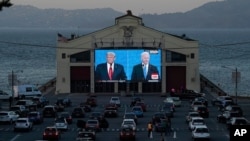U.S. Republican President Donald Trump and his Democratic challenger, former Vice President Joe Biden, engaged in a spirited debate Thursday night just ahead of the Nov. 3 national presidential election, presenting the nation with sharply divergent views of where they would take the country over the next four years.
For 90 minutes, they traded barbs. They attacked each other’s positions on controlling the coronavirus and curbing the continual advance of the country’s world-leading death toll of more than 222,000. They argued over health care, wages for low-income workers, crime, race relations in the U.S., climate change and leadership in the White House.
In the end, Trump said he deserved a second term in the White House because “success is going to bring us together. We had the best economy” before the coronavirus pandemic hit the country in early 2020 and that he would restore the world’s biggest economy.
But he claimed that if Biden wins, “You’ll have a depression like no one’s seen.”
Biden, a fixture on the American political scene for nearly a half century as a senator and second in command to former President Barack Obama, repeatedly assailed Trump’s presidency as misguided, uncaring and chaotic — while vowing to reunite the country.
“We’re going to have science over fiction, and hope over fear,” Biden said, “This election is about decency, honor, respect and treating people with dignity. You haven’t gotten that for the last four years.”
While both candidates scored important points in their final meeting, neither appeared to have gotten the upper hand or delivered a telling blow that might immediately alter the course of the campaign.
More civil, less rancorous
Even with pointed attacks on each other, their second and last debate 12 days before the election was more civil and less rancorous than the first time they faced each other on a debate stage in late September. The debate moderator, NBC News’ White House correspondent Kristen Welker, kept the discussion under control.
The two candidates, both in their 70s, interrupted each other Thursday night but not as much as three weeks ago, partly because the independent Commission on Presidential Debates alternately turned off their microphones for two minutes apiece as they began discussions of each of six new issues to allow each to answer without being interrupted by the other.
Watch related video by VOA’s Mike O’Sullivan:
The commission imposed the microphone regimen on the premise that American voters – at least the relatively few who claim they are still undecided on how they will vote – might get a clearer view of where each candidate might take the country when one of them is inaugurated Jan. 20 if each could deliver a statement uninterrupted.
Millions of Americans have made up their minds about the election, with more than 47 million people having cast early ballots by mail or in person. Many have said that during the coronavirus pandemic in the U.S. they wanted to avoid coming face to face with other voters in the expected long lines at polling stations on Election Day.
Biden laid into Trump’s handling of the coronavirus in his opening remarks, saying, “He says we’re rounding the corner” in dealing with the pandemic. “Anyone responsible for that many deaths should not remain as president. This is the same fella who told you it would be gone by Easter.”
Trump accused Biden of wanting to shut down the country to end the spread of the virus if he becomes president.
“He’ll close down the country if one person in our massive bureaucracy says shut it down,” Trump said.
“We have to open our country,” Trump said. “We can’t close up our nation or we won’t have a nation. … People are learning to live with it (COVID).”
“Live with it? No, people are learning to die with it,” Biden shot back.
Health care, minimum wage and more
On health care, Trump accused Biden of fostering a plan for “socialized medicine” in the country, but Biden said he wants to improve the Affordable Care Act adopted under Obama in 2010 while Trump has offered no replacement plan despite repeated promises to do so while seeking a legal ruling by the Supreme Court to end the health care program for millions of Americans amid the pandemic.
Biden said a national minimum wage of $15 hour an hour for workers was necessary to help low-income wage earners. But Trump said it should only be an option on a state-by-state basis because otherwise small businesses in some communities would be bankrupted by having to pay the higher wages beyond the current base wage of $7.25 an hour.
Biden claimed U.S. race relations have deteriorated under Trump. The president retorted, as he often has, that no U.S. leader, possibly other than Abraham Lincoln who freed slaves in the 19th century, has done more for black people than he has.
Trump attacked Biden for passage of a 1994 anti-crime bill that incarcerated far too many minorities for drug offenses. Biden acknowledged that the law was a mistake that over time he has worked to repair.
He said that drug users ought to be enrolled in health care treatment programs, not jailed.
“Nobody should be going to jail because they have a drug problem,” Biden said.
At another point, Trump claimed that Biden and his family had received millions of dollars in payments from foreign governments including China, Russia, and Ukraine, without offering proof.
“They’re like a vacuum cleaner, sucking up millions,” Trump claimed.
Biden responded, “The only guy making money (from foreign sources) is him,” gesturing at the president.
As Trump repeatedly attempted to reroute the debate focus back to the business deals of Biden’s son Hunter, the former vice president looked directly into the camera at the millions of voters watching the debate and said the election “is not about his family or my family. It’s about your family. We should be talking about your concerns.”
Thursday’s debate may have been the last, best chance for Trump, a real estate entrepreneur and reality television show host-turned-politician, to cut into Biden’s persistent lead in national and statewide polls. Biden holds an 8-to-10-percentage-point lead over Trump in national polls, but a lead of about half that in battleground states that will likely decide the overall outcome.






